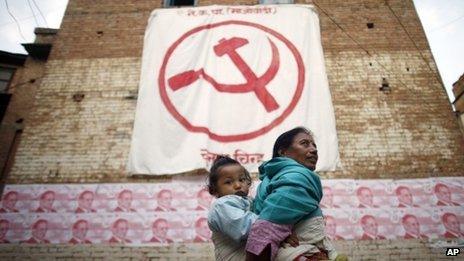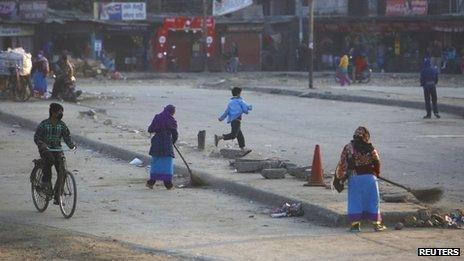Nepal opposition supporters held in pre-poll violence
- Published

The Maoist party is divided ahead of next week's elections
At least 28 people have been arrested in Nepal following a second day of opposition-led protests, Home Minister Madhav Ghimire has told the BBC.
He said that they are being held either for attempting to enforce a transport strike on Tuesday or for being involved in violent activities.
On Monday night about 40 bus passengers narrowly escaped being burnt to death.
Their vehicle was set on fire by protesters opposed to elections next week, local media reported.
Several other buses throughout the country were attacked throughout Tuesday.
The attacks were all staged by people opposed to the vote on 19 November, authorities say. The opposition has denied it is responsible for all the attacks,
An alliance of 33 opposition parties led by a splinter Maoist group ordered a nine-day transport strike after enforcing a general strike on Monday.
The splinter group is an offshoot from the main Maoist party which is expected to be one of the main contenders in the vote.
The breakaway Maoist faction and a variety of smaller parties want an interim government that was established to oversee the vote to be immediately disbanded.
They want a new government - with representation from all the political parties - to be formed that can conduct elections at a later date.

The opposition strike has resulted in many bus stations in the capital being closed
One of the vehicles they are accused of attacking was a bus travelling in Chitwan, about 120km (75 miles) west of Kathmandu. About 40 passengers inside were able to escape the burning vehicle by breaking its windows and jumping out, media reports said.
Elsewhere in the country, bombs have been defused by the army - including one planted at former Chief Whip Bhim Acharya's home in the south-eastern district of Sunsari.
Another bomb was reported to have been defused in Baglung district.
Correspondents say that the authorities are eager not to allow the vote to be disrupted by the splinter group and the smaller opposition parties. Security between now and polling day is likely to be significantly tightened.
The protests - including Monday's general strike - have forced businesses to close and brought much of the country to a standstill. Although most schools remained shut on Tuesday, many markets and businesses re-opened and there was more traffic on the roads.
The elections for a constituent assembly are the second since Nepal's 10-year civil war ended in 2006.
A previous assembly was supposed to draft a constitution in 2008, following the overthrow of the centuries-old monarchy. But it was bitterly divided and never accomplished its task.
The interim government now in power was formed earlier this year by the major political parties and is led by the Supreme Court's chief judge.
The election commission on Tuesday appealed to the protesters to stop their action and instead allow the country's 12.1 million eligible voters to go to the polls.
- Published12 September 2013
- Published14 March 2013
- Published19 June 2012
- Published7 December 2012